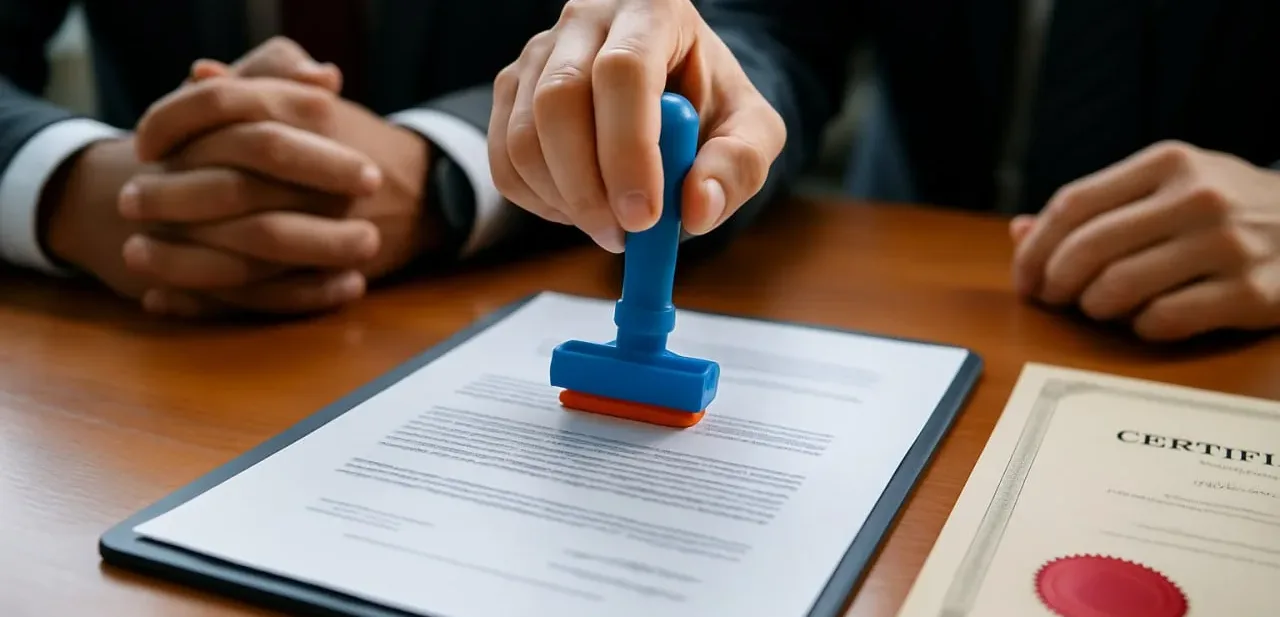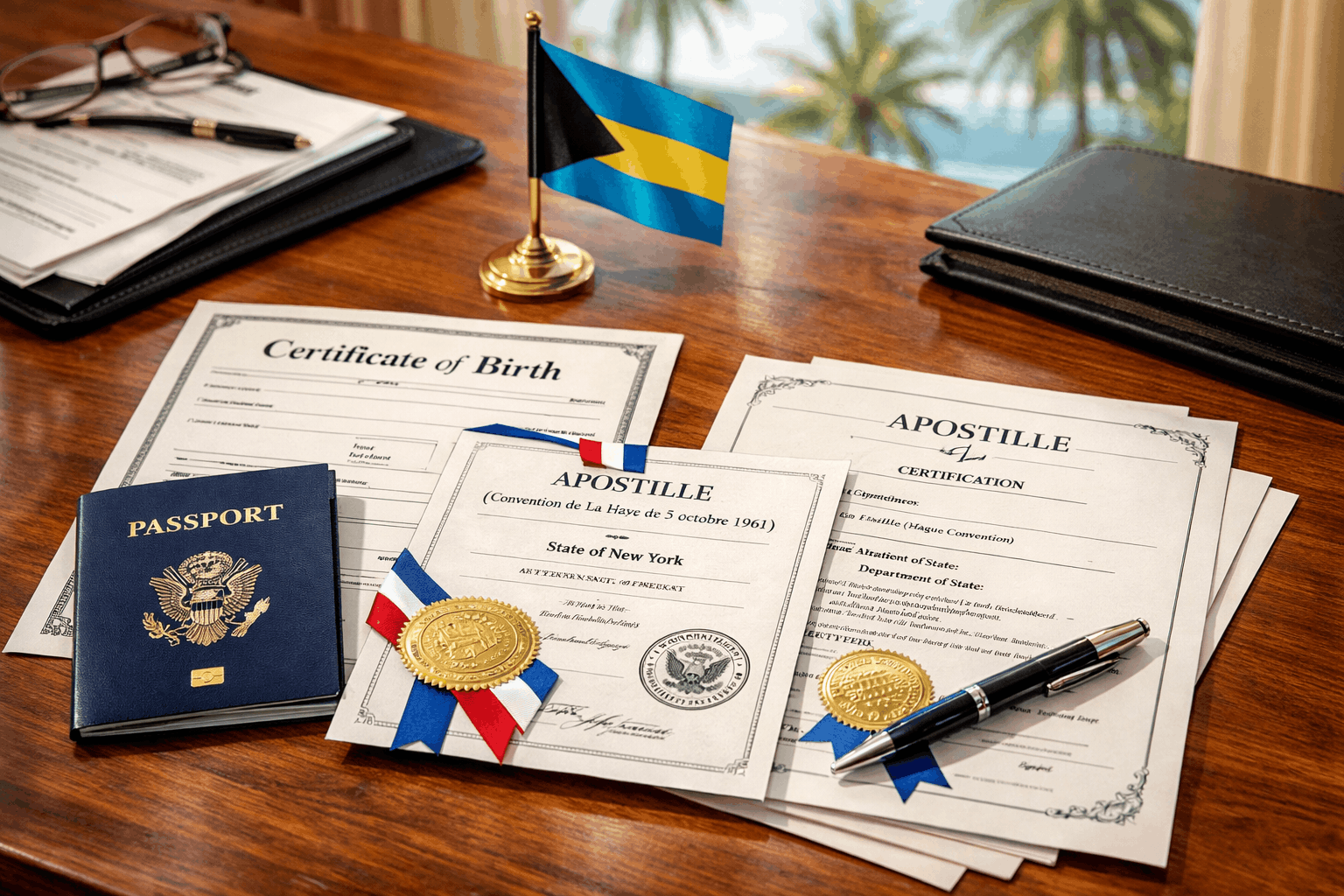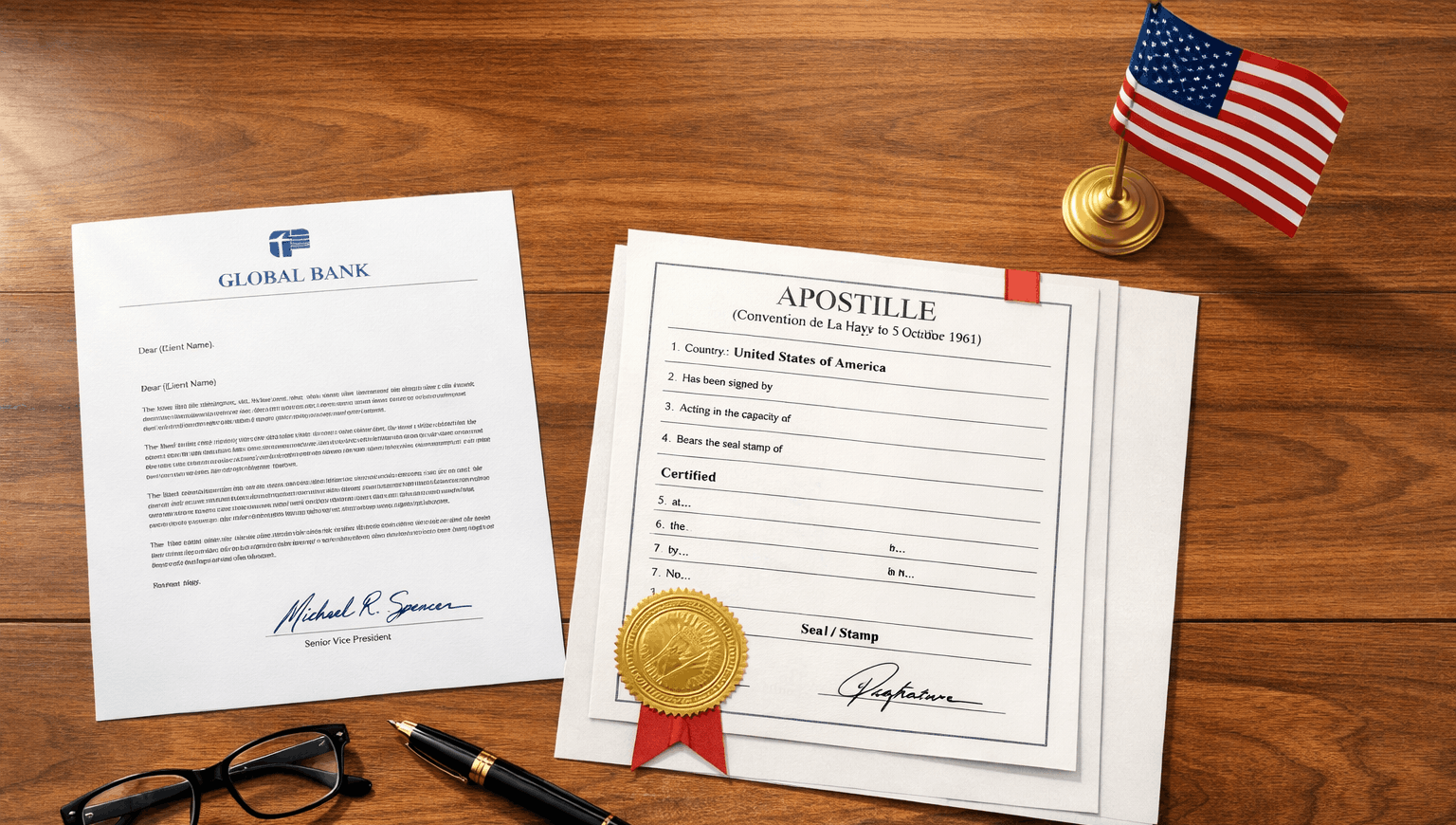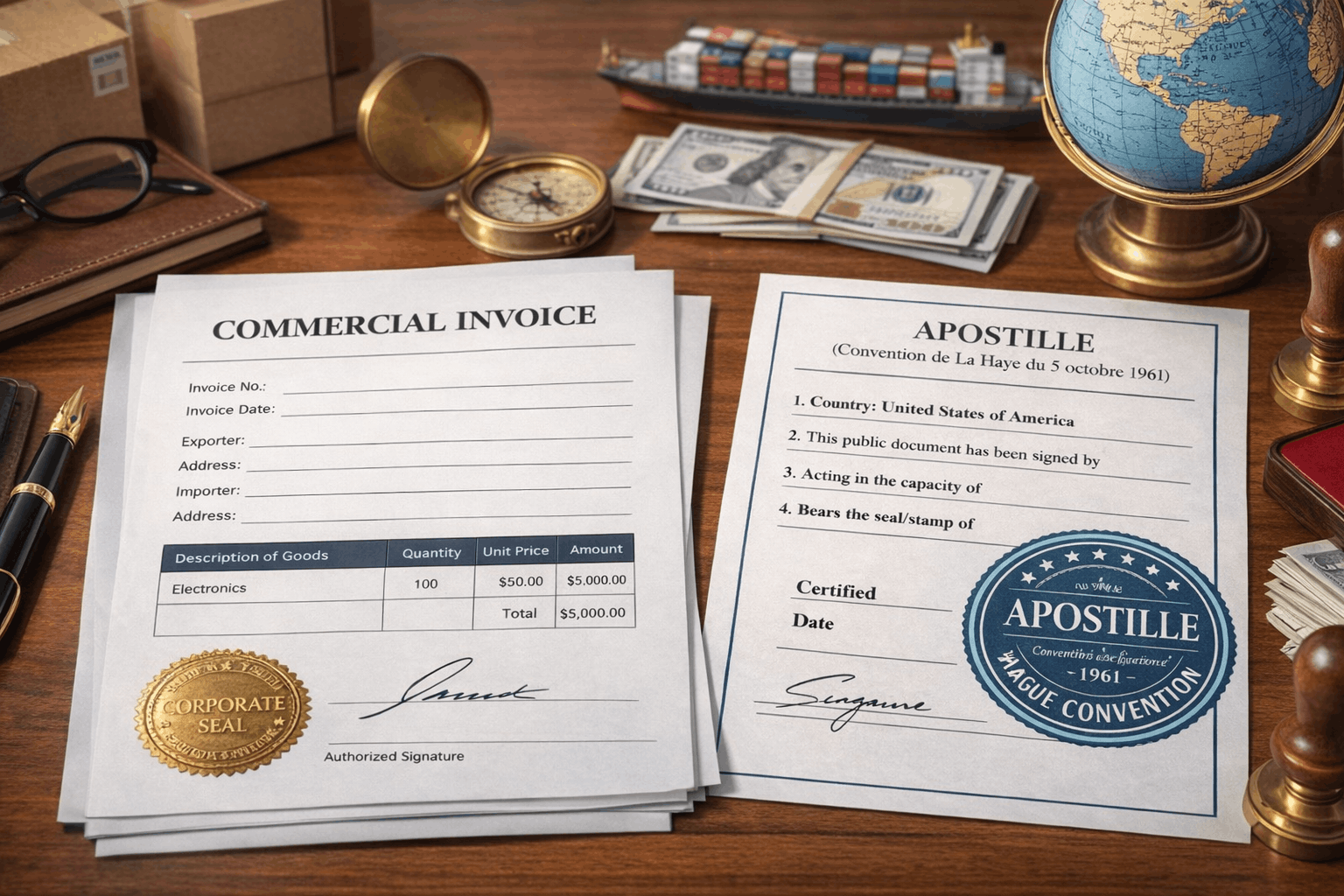
What is Document Legalization?
A foreign government asks you to validate your document for acceptance. You might have heard of document legalization, but what is it exactly? This process verifies paperwork for use in a non-Hague Convention country by inspecting signatures and seals. This post will demystify everything with a detailed explanation of how it works in the U.S. and guide you through the steps for a trouble-free global journey.
Understanding Document Legalization
We start by building a foundational understanding of document legalization before going into more details. This section will clarify its purpose, the distinction from apostille certification, and the reasoning behind this complex, multi-step method of international document authentication.
The Core Definition and Purpose
It’s a form of verification that offers the foreign government proof of authenticity for your domestically issued documents. This process is designed to combat fraudulent activities by establishing a chain of certifications from your home country and the destination where the papers will be sent.
How It Differs From Apostille Certification
Unlike the simplified apostille aimed at nations signing the Hague Convention, legalization is a more rigorous route required for non-members. It often entails multiple authentication steps at the state office, federal agency, and finally, the receiving country’s embassy or consulate.
Why Countries Require Legalization
Legalization is part of the effort to protect their legal systems and prevent fraud. The meticulous verification ensures foreign documents are genuine and can be used in serious legal matters. It serves as a safeguard that guarantees all international paperwork, such as a power of attorney or professional license, meets the receiving institution’s standards — whether it’s a court or employer abroad.
Types of Documents That Often Need Legalization
As you understand why legalization is necessary, it’s time to explore what documents require this process for foreign recognition. We have categorized the most common ones into the four types below, making it easier to determine whether your document needs to be legalized or not.
Personal Documents
Legalization of personal documents includes birth certificates for citizenship applications, marriage licenses for foreign weddings, or powers of attorney for inheritance settlements across borders. This assures your legal standing before a foreign government agency, allowing for smooth proceedings without any barriers in relation to documentation.
Academic and Professional Records
Think of academic transcripts, university diplomas, and professional licenses for law or medicine. To work or enroll in programs overseas, you’ll likely need to present these records as proof of your educational qualifications. Legalization confirms their legitimacy and recognition in the destination country.
Business and Corporate Documents
Opening a branch office abroad requires validated corporate paperwork — bylaws, articles of incorporation, and certificates of good standing. Legalization enables business owners to manage overseas operations and establish a legal presence in a foreign jurisdiction, unlocking potential for a successful global venture.
Government-Issued Certificates
Paperwork issued by government agencies also needs approval. These can be criminal background checks for visa purposes, medical certificates for health clearance, and customs documents for exporting goods. The document legalization process ensures recognition by foreign authorities.
The Step-by-Step Legalization Process
Learning how to legalize documents entails navigating a precise chain of authentication. The process is multi-layered, where your paperwork gains validity through a deliberate sequence of certifications. Here’s the path that every document must follow for international recognition.
Verification by the Issuing Authority
The journey begins at the document’s origin. This means the issuing authority must validate its own document first. For instance, a vital records registry can confirm your marriage license, or a college can certify your degree, demonstrating that these copies are genuine and accurately reflect the recorded files.
Notarization and Local Authentication
Notarization aims to verify the signature and seal of non-recordable documents, typically business contracts or affidavits. Followed by authentication at the state level, where your paperwork must be submitted to the Secretary of State’s office in the state of origin for approval. This step is a prerequisite for further authentication at the subsequent federal level.
Authentication at the National Level
Once certified by the state, you must send the document along with all certifications to the Authentication Office at the U.S. Department of State in Washington, D.C. Federal officials will then authenticate the signature and seal of the state government, such as the California Secretary of State or the Massachusetts Secretary of the Commonwealth.
Final Legalization at a Consulate or Embassy
The most important step is the final legalization at the embassy or consulate of the destination country, where the paperwork is intended for use. Foreign officials will review the domestic authentication string and affix their unique certificate. Embassy document legalization formally states that your paper fulfills the specific standards of their nation and is ready for legal acceptance.
When Legalization Is Required
Does every international endeavor require document legalization? This part will shed light on the common situations when you need to embark on this authentication journey. Legalization is essential for high-stakes proceedings where proof of authenticity is non-negotiable. Here’s a breakdown:
Studying or Working Abroad
Pursuing an international program or professional career overseas calls for legalization. Foreign universities and companies usually ask you to provide proof of your educational credentials. Legalizing an academic transcript or a college diploma in advance guarantees that your qualifications are recognized to meet visa and labor regulations in the host nation.
International Business and Trade Agreements
Enforcing business contracts demands a passport for your corporate documents. Authenticating patents or powers of attorney through legalization grants them legal weight in another country. You’ll likely need this process when establishing branch offices, securing international investments, and executing commercial transactions.
Immigration and Residency Applications
If you plan to immigrate or petition for residency, foreign authorities typically require verified documentation for background check purposes. Legalization ensures that birth certificates, marriage licenses, or criminal records qualify for processing visas, residence permits, and citizenship applications.
Cross-Border Legal Proceedings
Other circumstances where legalization is necessary involve foreign litigations, inheritance settlements, and legal disputes. Overseas courts may ask for verified powers of attorney, affidavits, and court orders to admit them into their judicial system. Neglecting legalization results in rejection, as these papers are considered non-binding.
Key Differences Between Apostille and Legalization
Many are confused about the apostille and legalization processes, as they both authenticate papers for international use. Understanding the key difference between an apostille vs. legalization is crucial to choosing the right path from the beginning. Let’s take a look at the three following factors:
Hague Convention Countries vs. Non-Hague Countries
The pivotal distinction is the status of your destination country regarding the Hague Convention. Simplified apostilles are acceptable in signatory nations, while non-members of this treaty only recognize the extensive legalization process.
Process Complexity and Timeframes
The apostille is a single-step authentication form, which is typically performed at either the state or federal level. This simple feature allows for a relatively swift turnaround time, ranging from a few days to a couple of weeks. Full legalization, on the other hand, is a much more complex process, which often takes months spanning across multiple verification authorities.
Acceptance Across Jurisdictions
Over 120 countries worldwide accept the apostille, as its format is universally standardized. In contrast, legalization is inherently country-specific since the final verification step is performed by the receiving country’s own embassy, tailoring the paperwork for exclusive use in their legal system.
Common Challenges in the Legalization Process
The most prepared authentication requests might present hurdles. Our expertise in the document legalization process shows us a few common pitfalls that applicants often encounter. Being aware of these frequent challenges helps you move smoothly towards success. Let’s reveal such obstacles in this part.
Rejected or Incomplete Documents
First-timers usually submit incorrect or incomplete documents and forms. Mistakes include outdated request forms, missing required certifications, and failing to provide supporting documents. It’s important to know the precise requirements of paperwork eligibility, as a minor flaw might halt the entire journey to legalization.
Long Processing Times and Delays
Sometimes, applicants underestimate the time it takes for the legalization procedure. Timelines are estimates rather than guarantees. During peak seasons, processing at the state, national, and consular offices might take several months. This results in your international plans being terminated. That’s why it’s always a wise move to prepare carefully and avoid rushing at the last minute.
Variations Between Different Embassies
There isn’t a universal rulebook for embassy legalization. Each country sets its own regulations regarding document quality, formatting, fees, and procedures. The lack of standardization can cause you costly mistakes and bureaucratic hassles.
Costs and Additional Requirements
Surprise costs may arise beyond the standard authentication fees. Some countries might ask for certified translations by approved vendors, extra certifications, or supplemental materials. You should also consider shipping and travel expenses since they can significantly impact the total cost of legalization.
Practical Tips to Simplify Legalization
The process seems complex, but keeping in mind some expert tips helps you create a strategic plan to achieve approval faster. We’ll explore four things you can do to streamline your legalization journey and ensure positive outcomes at the same time. Let’s dive in!
Start Early and Check Country-Specific Rules
Make time become your biggest asset. Begin the process months in advance and research the destination country’s regulations thoroughly. Remember to check for the latest requirements, as they may change without notice.
Work Only With Certified Originals
It’s crucial to note that photocopies and scans are unacceptable. Embassies, as well as other state and federal offices, only work with certified originals or notarized documents. Ensure the signatures and stamps on your certifications are legible and issued by the relevant authorities according to published standards.
Bundle Multiple Documents at Once
If you’re handling legalization for multiple documents for the same destination, remember to submit them in a single package for faster processing. Most embassies handle batch submissions, so requesting legalization for all your papers at once allows you to receive them simultaneously and reduce the courier fees.
Use Professional Assistance Services
Opt for professional assistance when you’re involved in complicated ordeals or urgent cases. Experts handle intricate requirements more efficiently, eliminating the risk of submission errors, managing logistics, and monitoring progress through their strong connections with authentication offices. Your paperwork will be recognized without a hitch, ultimately saving invaluable time and resources.
The Last Step Before Going Abroad
Document legalization is an essential authentication method for your U.S. documents to be recognized in a non-member country of the Hague Convention. Whether you’re legalizing personal records like birth certificates or corporate papers like bylaws, we have outlined the best roadmap for you to attain approval in this post. While legalization is complex, detailed preparation and time management strategies will empower rewarding success in your global endeavors.
FAQ
Can I legalize documents issued in another U.S. state?
Technically, yes. But you need to start with the state-level authentication in the state where your paperwork originates. It means you must obtain notarization and certification from that specific state before proceeding with the national and consular authentication steps.
Do I need to translate my documents before legalization?
Some countries might require certified translations, and this step should be performed before the state-level certification. Check with the destination country’s rules and your local state departments for more details about translation.
Can legalization be done by mail, or must I appear in person?
Yes, most authentication steps during the legalization process can be done remotely. Physical appearances are rarely required. You can use a reputable mailing or courier service to securely submit your authentication request.
Is there a difference between legalizing public vs. private documents?
Yes. Public documents are those recorded by government agencies, and you can request a certified copy from the issuing office. On the contrary, private documents such as business agreements often need notarization first to meet the state-level authentication qualifications.
What happens if the country I need to apostille for joined the Hague Convention after my document was issued?
The time of your legalization request submission matters, not when your document was issued. If the receiving country joins the Hague Convention before you make any request, you can proceed with the apostille instead. However, it’s best to consult with the embassy or consulate directly for updated guidance.





